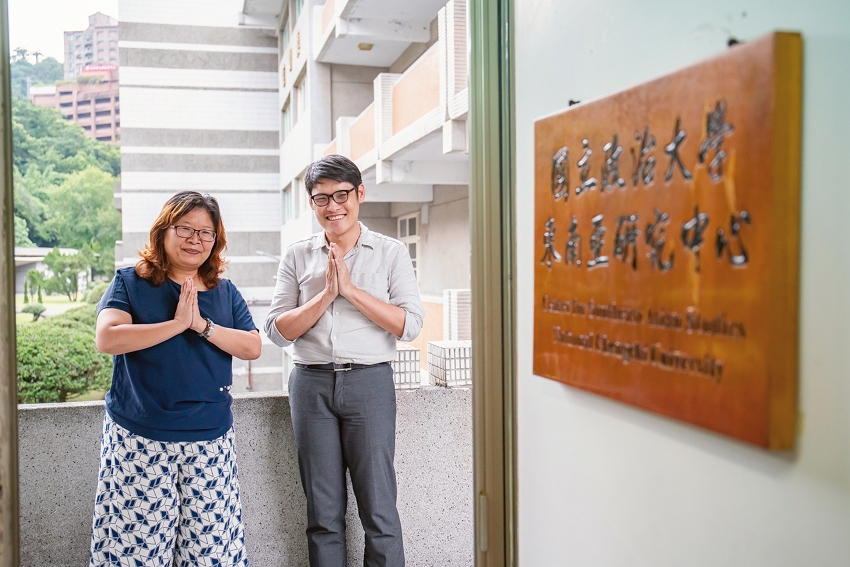
Researcher Ong Nga-ping has been working with Warasiriphong Chittaworn, a young scholar from Thailand, to promote exchanges between Thai and Taiwanese academic circles. (photo by Lin Min-hsuan)
Once out of Manila, the nightmarish traffic jams were finally behind them.
Last year, 15 students from countries including Taiwan, the Philippines, Cambodia, and Vietnam participated in the first Winter School for Advanced Philippine Studies workshop. The course was jointly organized by National Chengchi University’s Center for Southeast Asian Studies (CSEAS), the Philippines’ Southeast Asian Studies Regional Exchange Program (SEASREP), National Chi Nan University’s Department of Southeast Asian Studies, and the Taiwan‡Asia Exchange Foundation (TAEF). The workshop aims to cultivate young Taiwanese and Asian scholars and experts who are familiar with Taiwanese and Southeast Asian affairs.
The students traveled to the Philippines, where they took part in a nine-day series of courses dealing with the current state of social change in that country. To delve deeper into the local culture, the students made a special trip to Baguio City, a six to eight-hour bus ride from Manila. As scenery on the northbound journey flashed past, the young people got a good feeling for the gap between urban and rural areas. Workshops like the Philippine Winter School are part of the exchanges between CSEAS and Southeast-Asian academic circles.
In 2016, National Chengchi University established CSEAS to promote interdisciplinary regional research projects in areas such as international relations, foreign policy, political economy, society, culture, and ethnic languages, and to strengthen bilateral cooperation and communication between NCCU and top international institutions in Southeast Asian studies.
Linking top research centers
“NCCU is stepping up its Southeast Asian research. We’ve already signed memoranda of understanding with the world’s top ten Southeast Asia research centers,” says Associate Professor Ong Nga-ping, chair of NCCU’s Department of Ethnology and a researcher with CSEAS, describing the connection as an academic blockchain. In 2015, NCCU established the CSEAS Preparatory Office in cooperation with Kyoto University’s Center for Southeast Asian Studies; Dr. Michael Hsiao, a distinguished research fellow at Academia Sinica’s Institute of Sociology, acted as facilitator. With Dr. Alan Yang, deputy director of NCCU’s Institute of International Relations, serving as executive director, CSEAS has established partnerships with institutions such as the Vietnam Academy of Social Science’s Institute for Southeast Asian Studies and SEASREP in the Philippines.
The Winter School for Advanced Philippine Studies, one of the various exchange programs CSEAS has organized, is a practical means of enabling young scholars to observe Southeast Asian countries’ social problems from different perspectives. “Students first learn new ways of looking at issues, then go on to conduct fieldwork. They find that Taiwan and Southeast Asian nations are faced with many of the same problems,” Ong Nga-ping says.
One example is the Rice Terraces of the Philippine Cordilleras, inscribed on the UNESCO World Heritage List in 1995, which Ong visited with Winter School participants last year. A product of human ingenuity, the vast irrigation systems in Luzon’s Ifugao Province have felt the effects of rapid social change—an outflow of young people, the collapse of terraces, and the disappearance of traditional cultural rites have all negatively impacted local communities. “These problems are common to both Taiwan and the Philippines,” says Ong.
Feeling the land’s warmth
By engaging in in-depth academic exchanges, young Taiwanese scholars have become more aware of land issues in the Philippines. After land reform efforts failed, large numbers of rural residents migrated to Manila. Living in the overcrowded and chaotic city, Baguio’s indigenous people wistfully recall their ancestral homeland.
“We couldn’t get a feel for these things simply by reading books, but by going there, we were better able to understand locals’ thinking,” Ong Nga-ping says, smiling at photos and messages students sent back: “You don’t realize how beautiful the terraces are until you come here.” “Listening to the Hudhud chants of the Ifugao, we feel the power and beauty of humans’ relationship with the land. This is what makes field research so fascinating.”
Partners in the quest for knowledge
In August 2019, NCCU’s Center for Southeast Asian Studies hosted the “ASEAN Cultural and Economic Development Cross-Country Internship Program,” allowing NCCU students to gain first-hand experience in Thailand. In addition to visiting the Thai NGO Labour Rights Promotion Network Foundation (LPN), where they delved into issues of labor exploitation and human trafficking, students also got a taste of riverside life at Bangkok’s Amphawa Floating Market.
Holding in-depth discussions on labor exploitation with a Thai NGO “was a rare opportunity,” says Ong, adding that it would be difficult for most independent scholars to be granted such access. Warasiriphong Chittaworn, a doctoral student at NCCU’s Graduate Institute of East Asian Studies, acted as intermediary, taking advantage of the NGO’s good relations with Dr. Rungnapa Thepparp, associate dean of the College of Interdisciplinary Studies at Thailand’s Thammasat University, who made the arrangements.
Currently, NCCU holds weekly international workshops and lectures related to Southeast Asia, establishing cooperative links and agreements with countries targeted by Taiwan’s New Southbound Policy. The university welcomes many visiting scholars, and friendships have never been closer.
As a preeminent Southeast Asian studies think tank, CSEAS uses its influence to link together worldwide research in Southeast-Asia-related fields, allowing younger generations of scholars to find their voices.











